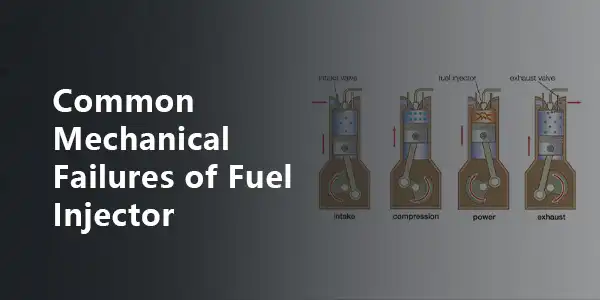Common Mechanical Failures of Fuel Injector
In some articles, you can easily know what a fuel injector is and how it works as well as different fuel injector suitable for various engine brands like fuel injector 400903-00074d for Doosan d24 and d18. In this article, you will learn about common mechanical failures of fuel injector.
Common mechanical failures of fuel injector
Common failures of fuel injector include mechanical and electrical failures. Mechanical failure includes fuel injector needle stuck, fuel injector clogged and leakage. When the above faults occur, it will affect the normal operation of the engine, sometimes even make the engine serious failure.
Fuel injector needle stuck
The work of the fuel injector is signaled by the engine control unit, and the electromagnetic coil of the fuel injector generates suction to drive the needle valve of the fuel injector after it is energized. Because the gap between the needle valve and the valve seat is blocked by the remaining sticky matter, the needle valve is astringent and cannot be opened normally, thus affecting the normal fuel injection volume. After the needle valve of the fuel injector is stuck, the engine will have symptoms such as difficulty in starting, unstable idle speed, and poor acceleration. The main cause of fuel injector sticking is the use of low-quality gasoline, because the paraffin and gum in low-quality gasoline cause the needle valve of the fuel injector to stick.
Fuel injector clogged
The fuel injector blockage fault can be divided into the internal blockage of the injector and the external blockage of the injector head. The internal blockage of the fuel injector is mostly caused by impurities and dirt mixed in the gasoline that block the movement gap of the needle valve inside the fuel injector, making the mechanical action of the fuel injector abnormal. When the fuel injector is clogged, the engine will experience symptoms such as difficulty in starting, unstable idling speed, and poor acceleration. In severe cases, it may even cause severe engine vibration and abnormal wear of related mechanical components.
Fuel injector leakage
Injector leakage faults are generally divided into two types: internal leakage and external leakage. The reason for the internal leakage of the fuel injector is mostly its early wear and tear during use, causing it to continuously leak fuel into the intake manifold under the action of system pressure. The external leakage of the fuel injector mostly occurs at the connection between the fuel injector and the fuel rail, and most of them are due to the poor sealing of the sealing surface. If the gasoline leaks outside the intake manifold, the oil drops on the cylinder block and will evaporate in the engine compartment after being heated. Once an electric spark occurs, it will cause a fire at any time.
When the fuel injector leaks internally, it will cause poor atomization of the fuel injected by the fuel injector, resulting in unstable engine operation, incomplete combustion of the mixture, and black smoke from the exhaust pipe, which will also cause the vehicle's fuel consumption increased significantly. When the fuel injector has an external leakage failure, it will cause difficulty in starting the engine, idling flameout, power loss, increased fuel consumption, running surge and poor acceleration, etc.
 Track Your Order
Track Your Order




